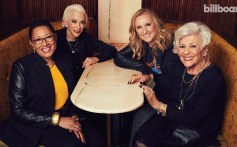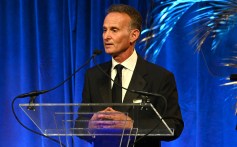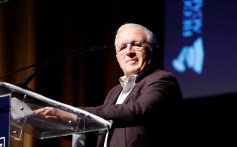billboard green
Trending on Billboard
For decades, the live music business has relied on a workforce built on gig labor — workers subject to long stretches away from home without the support found in traditional industries. That’s exactly the gap ECCHO Live — formerly known as Touring Career Workshop — is trying to close. And one of the people helping shape that shift is Chuck Hull, the retired tour manager whose 50-year career spans performers from Elvis Presley to Keith Urban.
Hull, who joined the organization’s expanded advisory board after retiring in 2023, says ECCHO Live is addressing a fundamental truth about the touring economy: “We’re essentially an industry with no real HR department, no safety net, and no guaranteed path for sustainability.”
Related
Last month, ECCHO Live held its largest workshop to date, attracting nearly 500 live event professionals to the Soundcheck Annex in Nashville, including keynote speaker Sarah Trahern, CEO of the Country Music Association. Hull says the large attendance and interest are indicative of an industry in need of support.
ECCHO Live began more than a decade ago as a modest career workshop led by lighting designer and production manager Chris Lyle, who wanted to help newcomers navigate the opaque, freelance-heavy touring world. The early focus was basic but essential, providing guidance in finding work, building a résumé, and handling the financial and personal challenges of life on the road.
One of ECCHO Live’s most influential initiatives is All Access, a first-of-its-kind mental-health program for touring professionals. The program provides four free counseling sessions to anyone working in live entertainment — an initiative that was recently expanded to include spouses. The expansion, Hull says, was an overdue acknowledgment of how touring affects entire families.
“When you’re gone for weeks or months, that stress isn’t just yours — it hits your partner, your kids, your home life,” he explains. “Extending support to spouses was a no-brainer.”
Related
During the pandemic, ECCHO Live saw a surge in demand for mental-wellness support, and those requests didn’t disappear once touring returned. To meet the growing need, the organization launched All Access On-Site, a roaming mental-health tent that appears backstage at major festivals. Crew members can discreetly sign up for same-day sessions with licensed counselors — a resource that was booked solid at many events.
“Festivals started calling us asking if they could get the activation,” Hull says. “That tells you everything about how needed this is.”
ECCHO Live also provides programming that addresses other weak points in touring employment and helps with financial guidance, including retirement planning for workers who rarely have access to 401(k)s. There are also career development workshops for entry-level and mid-career workers and department-specific training for roles in production, audio, lighting, video and crew management.
Hull describes these programs as “the kinds of resources every corporate employee takes for granted — but that simply don’t exist in live entertainment unless we create them ourselves.”
Related
ECCHO Live’s mission is supported by funding from a broad coalition of industry organizations, including the Country Music Association, the Academy of Country Music Awards, record labels, promoters, vendors and other stakeholders who rely on the touring labor pipeline.
Hull’s involvement with ECCHO Live comes after one of the longest continuous careers in modern touring. But while his résumé includes Elvis, Fleetwood Mac, Paul McCartney and a 20-year run managing Keith Urban, he says ECCHO Live isn’t about legacy — it’s about ensuring that the next generation of touring personnel have the resources he never had.
“I spent 50 years without a 401(k), without a health plan, without a safety net,” Hull says. “You survived by hustling. That shouldn’t be the only model we offer the people who keep this business running.”
From his advisory role, he sees ECCHO Live as a responsibility — and an overdue shift in an industry that historically expected workers to tough it out. “The old-school roadie mentality was ‘Bury it, don’t talk about it,’” he says. “But times have changed. People are finally willing to say when they need help. ECCHO Live is creating the space for that.”
Related
With a growing slate of sponsorships and a board that spans touring, vendor ops, production, festivals and corporate live events, ECCHO Live is positioning itself as the first true support network for the touring workforce.
“We’re building structure where there was none,” Hull said. “We’re supporting the people the entire live-entertainment economy is built on. And we’re finally acknowledging that taking care of crews isn’t a luxury — it’s essential.”
ASCAP has named media veteran Marc Zelanko as chief of staff, reporting directly to CEO Elizabeth Matthews. In this newly created role, Zelanko will help drive ASCAP’s mission to grow revenues and improve operational efficiency for its 1.1 million songwriters, composers, and music publishers.
Zelanko brings more than 20 years of experience in business operations and transformation within IP-driven media and entertainment companies. Most recently, he served as senior vice president at Paramount Global (formerly ViacomCBS), where he led strategic initiatives to strengthen operations and streamline processes across global teams. His wins include organizing CEO-level leadership forums, managing the COVID Task Force to maintain operations for 15,000-plus U.S. employees, reducing liabilities through HR process improvements and coordinating the Viacom Marketing Council.
Related
In the aughts, he spent five year at MTV Networks, where he rose to senior vp of business operations and notably helped scale Scratch, a creative consultancy launched by the network.
Earlier in his career, Zelanko worked in the Media & Entertainment Group at Booz Allen Hamilton. He holds a degree from Harvard University and an MBA from Harvard Business School.
Matthews praised Zelanko’s appointment, stating: “Marc is the perfect fit to help ASCAP deliver on our mission to grow revenues and drive efficiencies for the benefit of our more than 1.1 million songwriters, composers and music publishers. He brings a wealth of experience working cross-functionally to lead complex global initiatives, and we are excited to add him to our senior leadership team.”
Zelanko added: “ASCAP has a mindset of innovation and evolution to meet the changing needs of its members and licensees. I look forward to bringing my expertise to ASCAP’s mission in support of improving the future for its songwriters, composers and music publishers.”
This announcement follows ASCAP’s recent hire of John Pershing as Senior Vice President and Chief Technology Officer. Pershing, formerly with What If Media Group, brings extensive experience in IT, product development, and data engineering, further strengthening ASCAP’s leadership team.
Check out a full rundown of this week’s staffing news below.
Anne-Marie Pearce & Chris Barton (PPL)
Image Credit: Courtesy Photo
Trending on Billboard Mike Stoller, who co-wrote such legendary songs as “Hound Dog,” “Jailhouse Rock,” “Charlie Brown” and “Poison Ivy” with songwriting partner Jerry Lieber, has taken another step to ensure his musical legacy lives on. Stoller and his wife, jazz harpist and pianist Corky Stoller, are celebrating the dedication of the Mike & Corky […]
If you’re looking for vinyl records that sound better than streaming, it’s a great time to be a music fan. For years, executives wondered how big the vinyl business could get — I remember being told it would peak soon in 2014, when the format accounted for $315 million in U.S. revenue, according to the RIAA, […]

Specialist music publisher Dynamite Songs has acquired certain rights and royalty streams from singer-songwriter Eric Turner, R&B producer and songwriter John “$K” McGee and electronic music creators TIEKS and Dan Harkna.
The three deals add nearly 150 tracks to Dynamite’s portfolio, including Tinie Tempah’s multi-platinum hit “Written In The Stars,” Avicii’s “Broken Arrows,” TIEKS’s summer anthem “Sunshine” (feat. Dan Harkna), and Trey Songz’s standout “Neighbors Know My Name” from his Grammy-nominated album Ready.
Specifically, Dynamite has acquired the publishing and songwriting rights, along with global publishing and performance royalties, for selected works from the Turner and McGee catalogs, while its deal with TIEKS and Harkna is understood to be limited to the track “Sunshine.”
Turner is best known for co-writing and performing on “Written In The Stars” (see below) and collaborating with Avicii on “Dancing in My Head” and “Broken Arrows.” McGee helped shape modern R&B with tracks like “Neighbors Know My Name” and cuts for Jacquees. TIEKS and Harkna created “Sunshine”, a global dance hit boosted by Fiat’s 500 campaign and BBC Radio 1 support.
These acquisitions mark the latest phase of Dynamite’s expansion since its May launch, bringing its actively managed catalogue to around 1,200 works. The deals follow Dynamite’s earlier acquisitions of works tied to Ed Sheeran and Kendrick Lamar.
“What excites me most about these latest deals is how clearly they embody what Dynamite stands for – selective, high-quality acquisitions of music that truly matters,””” said Alan Wallis, CEO of Dynamite Songs. “With around 1 billion total streams between them, these catalogues have consistently demonstrated their commercial strength. We’re deeply grateful to John, Eric, Mark and Dan for entrusting us with these incredible works. As our robust pipeline of potential deals continues to expand, we look forward to partnering with even more creators who share our passion for timeless music and value our artist-first approach to dealmaking.””
Check out the rest of this week’s publishing news below, including Mushroom Music’s sub-publishing partnership with peermusic, 1916 Enterprises signing Chance Emerson, Karma Artists and Payday Music Publishing signing Benji, and Reservoir Media linking up with reggae publisher Abood Music.
Mushroom + Peermusic
Image Credit: Mary Megan Peer (credit: Melody Rae)
Trending on Billboard
Claire Rothman, a pioneering woman in the live entertainment industry whose positions included president and general manager of The Forum in Inglewood, Calif., died Saturday (Nov. 22) in Las Vegas. She was 97.
Rothman began her facilities career at the Spectrum in Philadelphia in 1967, when she was 39. In a 2018 Billboard roundtable with other women who broke barriers in live entertainment, she said, “It was the time when the National Hockey League expanded from six to 12 teams and a lot of new venues came up. The Spectrum was one. Two weeks after I took the job, it filed for bankruptcy. I was newly divorced, with one kid in college and one in high school. I thought, ‘Oh, God, what did I do?’ But in five years, we brought the Spectrum out of bankruptcy. We paid 100 cents on the dollar, and I wrote out every check. We formed one of the first partnerships with Electric Factory Concerts. We provided the building, they provided the acts.”
Related
Rothman was hired by then-Lakers owner Jack Kent Cooke to come to the Forum seven years later, in 1975, after stints at Wild Kingdom in Orlando, Fla., and the Cleveland Coliseum. She’s credited with introducing Cooke to Jerry Buss, who at that time owned a tennis franchise, the Los Angeles Strings, which she hoped to bring to the Forum, according to Men’s Health. In 1979, Buss bought the Lakers, which played at the Forum until 1999.
Buss’ daughter Jeanie, who is the controlling owner of the Lakers, paid tribute to Rothman Sunday night (Nov. 23), telling the Los Angeles Times, “Claire paved the way for women working in live entertainment. She was tenacious, creative and indomitable. My father always described her as the MVP who championed the Fabulous Forum as the West Coast concert rival to the legendary Madison Square Garden.”
Earlier today, the Lakers posted a photo of Rothman and Jeanie Buss on its Instagram with the caption, “Remembering an icon: Claire Rothman, the pioneering President of the Forum during the Showtime era.” The photo was taken in 2018, and Buss subsequently posted it on her social media, writing, “I was blessed with this amazing woman as my mentor, Claire Rothman. She has been there for me at every crossroads and hurdle placed before me. I don’t tell her enough of how grateful I am. Thank you Claire! I love you.”
Related
During her early tenure at the Forum, Rothman was the only woman managing a venue that included an NBA (the Los Angeles Lakers) and NHL (Los Angeles Kings) franchise while also juggling concerts, circuses and other entertainment.
“So I was a curiosity. Everybody remembered my name because I was the only one,” she told Billboard. “I was very fortunate to work for men who had good relationships with their mothers and their wives. They were sure of their masculinity. Every man I ever worked for pushed me [to succeed]. A psychologist friend of mine said the reason they were supportive was I never gave them the feeling that I wanted their jobs — because I didn’t. I had ambition, but I wanted to do it myself.”
Rothman helped oversee a golden time for the Lakers, known as the Showtime era, that started in 1979 as players like Magic Johnson and Kareem Abdul-Jabbar helped the team dominate and win five championships over 10 years. That period was captured in the 2022-2023 HBO drama Winning Time: The Rise of the Lakers Dynasty. Rothman was portrayed by Gaby Hoffman in the series.
Related
Rothman also heightened the Forum’s appeal as a must-stop for concerts, including by bringing Prince to the venue for a six-night run in 1985, and was bold and unrelenting when it came to pursuing talent. A 1985 Los Angeles Times profile on Rothman recounted her asking Barry Manilow to play the arena in front of rival promoters, the Nederlanders, who were also pursuing the singer. “When Manilow half-jokingly asked why she would make a pitch in front of the competition, Rothman replied, ‘I’m cuter,’” the Los Angeles Times reported.
Rothman left the Forum in 1995, moving to Ticketmaster, where she was executive vp until 1999. She also served on a number of boards, including City of Hope, the Music Center of Los Angeles County and the Reprise Theater Company, according to her LinkedIn page.
Survivors include a son, daughter, grandchildren and great-grandchildren, according to the Los Angeles Times.

Independent music company EMPIRE has announced a wave of key leadership moves across its publishing, commerce and Nashville divisions as the company celebrates its 15th anniversary.
Vinny Kumar has been promoted to president of EMPIRE Publishing, where he’ll continue overseeing global deals and strategy. Under Kumar’s leadership, EMPIRE Publishing has become a leading independent publisher, representing Grammy and Latin Grammy-nominated songwriters and earning recognition across ASCAP, BMI, and NMPA awards. The division debuted in Billboard’s Hot 100 Publisher Rankings Top 10 in 2024.
“We met nearly two decades ago and he’s been part of the foundation of what this company stands for,” EMPIRE founder and CEO Ghazi said of Kumar. “He will continue to lead with integrity and creativity, and his passion for music and strategic vision have helped elevate every facet of our publishing business.”
Vinny Kumar
EMPIRE Africa also launched its publishing arm under managing director Munyaradzi Chanetsa, with notable successes from writers behind Davido’s Grammy-nominated “Unavailable” and multiple Southern African hits.
Meanwhile, Matthew Maysonet has been elevated to senior vice president of commerce and streaming partnerships, leading a global team of nearly 20. Andrea Galicia moves up to senior director, while Goldie Harrison (formerly of UnitedMasters) and Daisy Moreira (a Def Jam veteran) join as directors in the division. The team will drive monetization and streaming strategies for EMPIRE’s diverse roster, including Latin and global acts.
Galicia, Harrison and Moreira
In Music City, EMPIRE Nashville added Bri Small as vice president of digital and Zak Waters as director of A&R. Small (ex-Warner Music Nashville) will lead digital engagement for Nashville artists, while songwriter and producer Waters will focus on talent discovery and creative development. Both hires underscore EMPIRE’s commitment to an artist-first, genre-fluid approach in one of the industry’s most competitive markets.
EMPIRE Nashville leader Jen Way praised Small for bringing “such a special energy and creativity to everything she does,” calling her the ideal person to guide the label’s digital strategy. She described Waters as a versatile creative with strong storytelling instincts who will “represent exactly where EMPIRE Nashville is headed—artist-first, genre-fluid, and creatively fearless.”
Bri Small (Credit: David Bradley) and Zak Waters (Credit: Zak Cassar)
Check out a full rundown of this week’s staffing news below.
Dee Hale (Sony Music Publishing)
Image Credit: Amy Allmand Photography
Trending on Billboard
Last week, GoldState Music founder and managing partner Charles Goldstuck gathered his investors along with a collection of music’s most brilliant minds for “Conversations in Music,” a three-day conference about the future of the business.
Goldstuck has been convening exclusive thought-leadership meetings for decades in his many roles: he’s the founder of The Sanctuary at Albany, a state-of-the-art recording studio and music academy in the Bahamas; the executive chairman of TouchTunes Interactive Networks, and a major-label veteran who ran business operations for BMG’s music labels and co-founded J Records with Clive Davis, building it into the RCA Music Group.
Related
But the South African philanthropist said that this year’s event — which he hosted at the luxurious Pier Sixty-Six resort in Ft. Lauderdale, Florida — marked his first event of such scale and urgency, reflecting the speed at which industry dynamics are changing.
Each expert-moderated conversation was packed with insight, and reflected Goldstuck’s own keen interest in the intersection of AI and music — he is currently funding the AI & African Music initiative at his alma mater, Witz University in Johannesburg, to empower creatives to use AI to preserve, teach or co-create African musical traditions and sounds, and recently published a paper arguing that music companies ought to negotiate deals with AI companies to set precedent before courts and lawmakers weigh in.
Among the conference highlights: Water & Music’s AI analyst and music producer Yung Spielberg demonstrated how to make songs using Suno. MIT professors showcased the cutting-edge music technology their top students are building. DAYA, a GoldState artist who shot to fame with her feature on Chainsmokers’ “Don’t Let Me Down,” revealed how she’s navigating the modern industry and shared her new music. Dr. Tamay Aykut, founder and CEO of Sureel, broke down the possibilities for how to determine which rights holders should get credit for music produced with AI models trained on their works.
We asked Goldstuck for his five top takeaways from the invite-only affair – here’s what he pointed to.
Publishers are gaining leverage. The deal between Kobalt and ElevenLabs establishes a 50-50 split between publishers and recorded-music rights holders, a big improvement from streaming and sales, which have paid out lower rates to publishers. This sets a new precedent for future generative AI licensing deals, with publishers now in a position to secure stronger economic outcomes as the landscape evolves. Industry surveys estimate that more than half of younger creators already use AI tools in their workflows, suggesting that generative AI could make songwriters more productive.
Laurent Hubert (Left), CEO of Kobalt Music, Mary Megan Peer (Center), CEO of peermusic, and Kristin Robinson (Right), Senior Correspondent at Billboard – at the GoldState Conversations in Music Conference
Courtesy of GoldState Conversations in Music Conference
Music catalog deal volume is at a record high. Buyers include both established music companies and financial investors. There have been no significant defaults or financial problems across these transactions in recent years, fueling the highest level of investor confidence seen in the sector since the Napster era. The market is competitive, but investors are employing more sophisticated knowledge and due diligence thanks to increased transparency from the digital music ecosystem. And yet, there are only two major players in the catalog valuation space. Is there room for more?
The indies are rising. Independent music companies claim nearly half the global market share and the majority of new releases in 2025. Improved creator tools, the proliferation of distribution options, and the ease of accessing audiences across more than 700 digital and social platforms worldwide are powering the expansion of independent distributors like Symphonic Distribution, Too Lost, Create Music Group, and Empire, all of whom are posting double-digit annual growth. Financing for independent creators is getting more sophisticated too, with leading distro platforms now offering artists advances based on real-time consumption data.
Ghazi Shami (Left), Founder and CEO of EMPIRE, and Priyanka Khimani (Right), Founding Partner of Khimani & Associates – at the GoldState Conversations in Music Conference
Courtesy of GoldState Conversations in Music Conference
Investing in China and India is about to get easier. Historically, Western artists and rightsholders lacked clarity on Chinese consumption, but Luminate’s new licensing partnership with Tencent Music promises new transparency from the world’s fifth-largest music market. Luminate is also ramping up its Indian market data coverage, as Billboard launches in India.
AI detection and attribution technologies will be key. Only a handful of formal licenses have been announced for generative AI platforms and music, but commercial and licensing momentum is building. Landmark agreements include those between Kobalt and ElevenLabs, Merlin and ElevenLabs, and the Universal Music Group with Udio. As Goldstuck wrote in his paper, Past Precedent, Future Proof: Towards a New Commercial and Legal Framework for AI-Generated Music, generative AI platforms and rightsholders should move towards collaboration through negotiated settlements, not litigation, so as to pave the way for a more standardized commercial licensing regime for AI-generated music. Accurate detection will help monitor the use of tracks for training, while new attribution systems will be critical for properly crediting and compensating rights holders and creators for outputs. Platforms like Deezer, which offers detection, and Sureel, which specializes in attribution, are showing early promise in moving the industry towards proactive AI music tracing and licensing, but widespread adoption will require a lot more work.
Charles Goldstuck (Left), Recording Artist Daya (Center), and David Conway (Right), President of Hard 8 Working Group and Daya’s Manager – at the GoldState Conversations in Music Conference
Courtesy of GoldState Conversations in Music Conference
Next week, Harbourview Equity founder and CEO Sherrese Clarke Soares brings her investors to Miami for another series of panel conversations, as the investor-conference circuit continues.
Trending on Billboard
Billboard has partnered with Starlite, the Spanish company that produces and hosts the annual Starlite Festivals in Marbella and Madrid, to produce its first Billboard No. 1s event outside of the United States, and the first to be devoted to Latin Music.
Billboard No. 1s Spain — or Billboard Números Uno España — will take place Dec. 15 at IFEMA in Madrid, as part of the week-long programming of Starlite Madrid. The evening will feature performances by artists who have entered the top 10 of the Billboard Hits of the World Spain Songs chart, along with special honors.
Related
Although Billboard has hosted other Billboard No. 1s, this marks the first time the event will feature multiple live performances in a concert setting.
“Partnering with Billboard, the Bible of the music industry, is an honor for us,” said Sandra García-Sanjuán, founder and CEO of Starlite. “It’s an honor to partner with Billboard, especially because it’s the first time they do a Billboard No. 1s event outside of the U.S.”
“As Billboard expands its international presence, we’re thrilled to partner with Starlite for our first live concert event in Spain,” said Leila Cobo, Billboard’s chief content officer for Latin/español. “Starlite is an iconic, innovative brand that’s created a unique festival unlike anything else, and Sandra is a visionary executive. We’re excited to launch our Billboard No. 1s in Spain with them.”
García-Sanjuán’s Starlite Festival in Marbella, billed as “the best boutique festival in the world,” spans 60 days of concerts between June and August in the Spanish city of Marbella, with an A-list roster of artists that this year included Marc Anthony, Santana, Emilia, Nathy Peluso and Camila Cabello.
The Billboard-Starlite partnership was initially announced during Billboard Latin Music Week, and details have been finalized since then.
The Madrid edition of Starlite kicks off Dec. 12 with a concert by Melendi and ends Dec. 22 with Manuel Carrasco. The Billboard No. 1s concert will be held Dec. 15. Tickets are already available for sale, with a full lineup to be announced soon.
Trending on Billboard
David Israelite’s guest column on October 23, 2025 explained how little music creators get paid across different streaming services. I just want to lay out the facts and be clear: YouTube pays the least for music, full stop. They always have and always will unless someone stands up to them. They’ll throw up smoke screens and tempt you to look the other way, but let’s not be fooled.
YouTube recently touted that it paid artists $8 billion over the past year. This sounds impressive, but it’s not. During the same period, Spotify generated roughly $18 billion in revenue and paid about $12 billion to music rights holders — nearly 67% of its revenue. By contrast, YouTube generated $60 billion in revenue and paid only $8 billion to rights holders — about 13%. YouTube will say they’re not just a music service. But I would argue that YouTube never would have become such a successful platform without music, and even if only one-third of their revenue comes from music (and it’s likely higher), they certainly should be paying more than Spotify, not 50% less.
Related
How does YouTube pay less than their competitors? They are a behemoth bully. They have 2.7 billion monthly active users and more than $60 billion in annual revenue. It’s the dominant video platform, with more hours streamed than Netflix. It’s the largest music service, with more users than Spotify. And in the “traditional” TV space, it’s on track to surpass Comcast as the largest U.S. cable provider. This company now owns audience and content delivery in a way the world has never seen before.
Their tyranny isn’t just limited to music. If you read the headlines, you will see a pattern of coercion: YouTube vs. Televisa/Univision. YouTube vs. NBCUniversal. YouTube vs. Fox. YouTube vs. Paramount. And now YouTube vs. Disney. The playbook is always the same: if you refuse to accept YouTube’s below-market terms, YouTube threatens to go dark until you capitulate. They then shift the blame and spin the story — when in reality, YouTube just wants to pay less.
And now they’re trying to dictate terms to consumers too. If you’re a YouTube TV subscriber, you received an email saying “if Disney’s content is unavailable for an extended period of time,” YouTube will give you a paltry $20 credit. So, YouTube gets to unilaterally decide for consumers how long is too long and how much ESPN is worth to them? They bully the people creating the content and then they bully the consumers who want access to it.
Related
Disney understands that “content is king,” but at YouTube, content is just a pawn in their game. And the game at YouTube is clearly about aggregating services and market power (across Google and YouTube) and using that market power to strong-arm everyone in the ecosystem — rights holders, content creators, advertisers, everyone — for their own financial gain. YouTube is showing us what happens when unchecked power and greed collide.
Thankfully, Disney is standing up to YouTube, and we all need to support Disney because enough is enough. As artists, consumers, and companies, let’s voice our support for Disney in this battle with YouTube. And in parallel, Washington needs to take a good hard look at YouTube’s abuse of market power and explore whether it’s time to break up Google so that YouTube, YouTube Music, and YouTube TV are separate businesses that finally have to compete on a level playing field.
YouTube: without the artists, athletes, and actors, there is no business.
Irving Azoff holds the title of chairman and CEO of The Azoff Company and is the personal manager of the legendary Eagles, Jon Bon Jovi, U2, John Mayer, Van Halen, Gwen Stefani, Steely Dan, Maroon 5, and many others. The Azoff Company is a privately held media and entertainment company dedicated to investing in positively disruptive businesses that put artists and fans first. Azoff was inducted into the Rock and Roll Hall of Fame in 2020.

 State Champ Radio
State Champ Radio 








